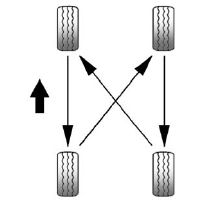Tire Rotation
Tires should be rotated every 12 000 km (7,500 mi). See Maintenance Schedule.
Tires are rotated to achieve a uniform wear for all tires. The first rotation is the most important.
Any time unusual wear is noticed, rotate the tires as soon as possible and check the wheel alignment. Also check for damaged tires or wheels. See When It Is Time for New Tires and Wheel Replacement.

Use this rotation pattern when rotating the tires.
Do not include the compact spare tire in the tire rotation.
Adjust the front and rear tires to the recommended inflation pressure on the Tire and Loading Information label after the tires have been rotated. See Tire Pressure and Vehicle Load Limits.
Reset the Tire Pressure Monitor System. See Tire Pressure Monitor Operation.
Check that all wheel nuts are properly tightened. See “Wheel Nut Torque” under Capacities and Specifications.
WARNING!
Rust or dirt on a wheel, or on the
parts to which it is fastened, can
make wheel nuts become loose
after time. The wheel could come
off and cause an accident. When
changing a wheel, remove any
rust or dirt from places where the
wheel attaches to the vehicle. In
an emergency, a cloth or a paper
towel can be used; however, use
a scraper or wire brush later to
remove all rust or dirt.
Lightly coat the center of the wheel hub with wheel bearing grease after a wheel change or tire rotation to prevent corrosion or rust build-up. Do not get grease on the flat wheel mounting surface or on the wheel nuts or bolts.
See also:
Exiting the Feature Settings Menu
The feature settings menu will be exited when any of
the following occurs:
• The vehicle is shifted out of P (Park).
• The vehicle is no longer in ON/RUN.
• The trip/fuel or vehicle informa ...
Using the Delete Command
The delete command is used to delete specific name tags.
To delete name tags:
1. Press
.
► For vehicles without a navigation system, the system responds “Ready,” followed by a tone.
...
Parking on Hills
WARNING
Parking the vehicle on a hill with the trailer attached can be
dangerous. If something goes wrong, the rig could start to move. People can be injured,
and both the vehicle and the trailer ...


